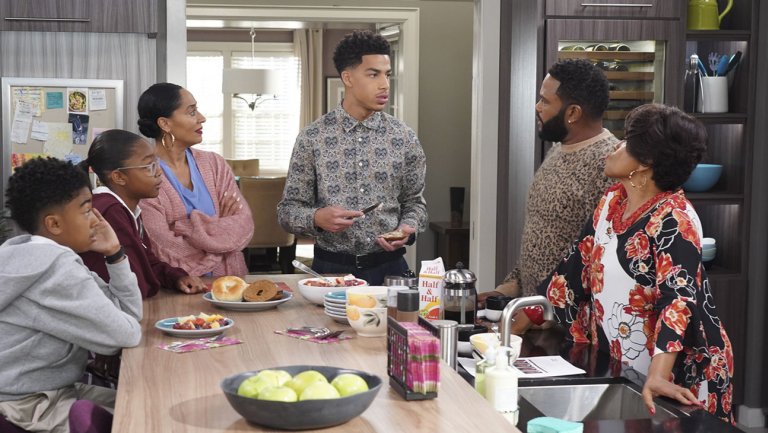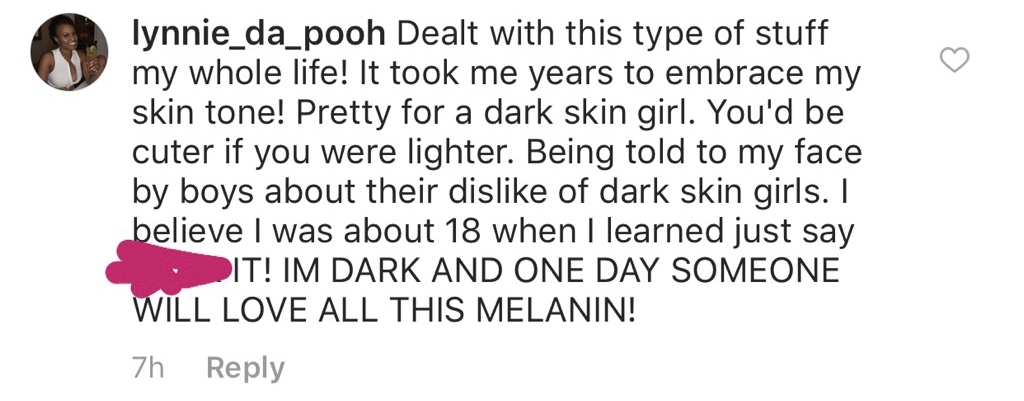Sigh. The issue of colorism is a heavy topic that most shy from, for understandable reasons. Those who have never experienced it deny that it exists and those that have struggle to express the hurt to others in a healthy way. However, Peter Saji, writer for ABC's hit show "Black-Ish" did an excellent job at restarting this much needed conversation. The trailer alone touched on a few issues young women with darker skin tones experience on almost a daily basis, such as discouragement from wearing vibrant lipsticks or being told that she is "pretty for a dark skinned girl". Take a look at the clips below!
As if the clips weren't explosive enough the full episode was immensely powerful and a tear jerker as well. It honestly resurfaced some of the negativity we experienced as young women during our school years. What we appreciated most was that both sides of the issue were addressed equally. Those with darker skin tones usually experience the brunt of the inflicting pain, as the narrative is that light skin is beautiful and dark skin is not. However, negative colorist views towards those with a lighter skin tones were also addressed; the narrative that that they are not "black enough", are privileged and should be able to deal with seemingly harmless jokes made about such privilege. The weightiness of the family dynamic was also addressed. In many ways, almost all members of the Johnson family were both the victims and culprits of colorism, passively burdening others with their own insecurities.
Our thoughts? Colorism exists and it's ugly. We have personally experienced what it feels like to be targeted and bullied in school, all because we were darker. As we became adults, we noticed more subtle acts of discrimination that continued, and we were also able to identify instances in our lives where close family members and/or friends also passively passed on their own insecurities and negative views onto us.
Though we have our own views, we realized that healing can only happen when we all come together and talk about the elephant in the room, addressing both sides of the spectrum when it comes to the issue of colorism. So, we posted the clips on Instagram to spark up this conversation with our followers and asked a view key questions. Do you think colorism exists? Why or why not? Are people of a darker skin tone just hyper sensitive or is this a real issue? Most importantly, how can we address/fix this issue?
Chile, we were surprised we didn't break Instagram (a bit vain to say for little ol' us right?)! The responses POURED in. Check out a few views that stood out to us below! And, the conversation is FAR from over! Let us know your thoughts. Email us, join in the conversation by commenting on the post on our Instagram, comment here, or however else you see fit! Like Dre (played by Anthony Anderson) said at the end of the episode, "nothing gets better in the shadows". So, let's continue to talk about it!
As if the clips weren't explosive enough the full episode was immensely powerful and a tear jerker as well. It honestly resurfaced some of the negativity we experienced as young women during our school years. What we appreciated most was that both sides of the issue were addressed equally. Those with darker skin tones usually experience the brunt of the inflicting pain, as the narrative is that light skin is beautiful and dark skin is not. However, negative colorist views towards those with a lighter skin tones were also addressed; the narrative that that they are not "black enough", are privileged and should be able to deal with seemingly harmless jokes made about such privilege. The weightiness of the family dynamic was also addressed. In many ways, almost all members of the Johnson family were both the victims and culprits of colorism, passively burdening others with their own insecurities.
Our thoughts? Colorism exists and it's ugly. We have personally experienced what it feels like to be targeted and bullied in school, all because we were darker. As we became adults, we noticed more subtle acts of discrimination that continued, and we were also able to identify instances in our lives where close family members and/or friends also passively passed on their own insecurities and negative views onto us.
Though we have our own views, we realized that healing can only happen when we all come together and talk about the elephant in the room, addressing both sides of the spectrum when it comes to the issue of colorism. So, we posted the clips on Instagram to spark up this conversation with our followers and asked a view key questions. Do you think colorism exists? Why or why not? Are people of a darker skin tone just hyper sensitive or is this a real issue? Most importantly, how can we address/fix this issue?
Chile, we were surprised we didn't break Instagram (a bit vain to say for little ol' us right?)! The responses POURED in. Check out a few views that stood out to us below! And, the conversation is FAR from over! Let us know your thoughts. Email us, join in the conversation by commenting on the post on our Instagram, comment here, or however else you see fit! Like Dre (played by Anthony Anderson) said at the end of the episode, "nothing gets better in the shadows". So, let's continue to talk about it!



Leave a comment